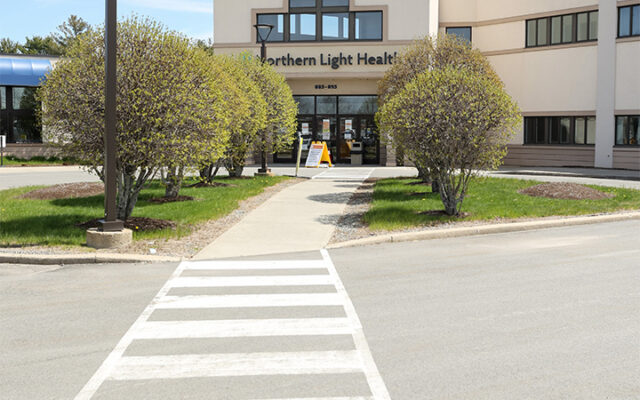
More than 1,000 Maine hospital staffers missed work Wednesday due to COVID
By David Marino Jr., Bangor Daily News Staff
More than 1,000 Maine hospital workers were out of work Wednesday either because they had contracted COVID-19 or been exposed to the virus.
The absences are worsening already acute health care staffing shortages as the state faces near-record coronavirus hospitalizations and an omicron variant that’s far more contagious than past forms of the virus.
Nearly 500 employees in the 10-hospital Northern Light Health system were out due to COVID-19 on Wednesday, either because they were infected or were quarantining due to exposure to the virus, said Paul Bolin, Northern Light’s chief human resources officer. They make up around 4 percent of the system’s total workforce of more than 12,000, slightly above the highest level of absences during last year’s winter surge.
“That number is more than double what it was a month ago,” Bolin said. “It’s a significant sign.”
The Portland-based MaineHealth system saw 842 employees out of work Wednesday due to COVID-19, also about 4 percent of that nine-hospital system’s workforce. The number of employees out Wednesday was more than four times the number of absences before Christmas, spokesperson John Porter said.
Maine Medical Center last month started postponing some non-emergency procedures and closing operating rooms so the Portland hospital could create and staff more ICU beds. The surge in staff absences only adds to the stressors on the health care system, Porter said.
Though health care workers wear protective equipment at all times, constant treatment of infectious COVID patients in hospitals can lead to infections fairly easily. One study published by the British Medical Association found that health care workers are seven times more likely than workers in non-essential fields to contract severe COVID.
These employees also encounter the same risks of exposure to COVID as the general public.
The vast majority of Northern Light employees who tested positive said they had been close contacts of people with the virus outside of work, Bolin said.
“Outside work behavior is really a significant safety issue for our staff, as well as for our community at large,” Bolin said.
Bolin said the temporary loss of nearly one of every 20 staff members due to the virus would undoubtedly hurt operations. He hopes that number won’t rise, though he said the system was preparing for the worst in the aftermath of Christmas and New Year’s celebrations.
Augusta-based MaineGeneral Health currently has about 125 staff members out due to COVID-19 or a seasonal illness, spokesperson Joy McKenna said Wednesday. They make up around 3 percent of that system’s 4,500 employees.
The hospital system has not had to divert patients to other facilities or pause any operations, McKenna said.
“With careful and continuous planning, we have been able to sustain services,” she said.
Redington-Fairview General Hospital in Skowhegan saw around 20 of its approximately 770 employees test positive last month, said Sherry Rogers, the hospital’s chief nursing officer. Redington-Fairview serves much of Somerset County, a region that has seen by far the highest hospitalization rate of any Maine county since Dec. 27, according to Maine Center for Disease Control and Prevention data.
The absences haven’t significantly affected operations, Rogers said, though there remain persistent staffing shortages in some parts of the hospital, including the ICU.
While those infected in December isolated for 10 days, the hospital has recently adopted U.S. Centers for Disease Control and Prevention guidelines that allow people to leave isolation after five days if they aren’t showing symptoms on the condition that they wear a mask at all times in the five days after. Masks are already required for everyone on Redington-Fairview property.
“We really haven’t seen how that’s going to impact things,” Rogers said.
The U.S. CDC also has specific guidelines for health care workers, though they are not legally binding and hospitals can form their own policies.
Under conventional circumstances in those guidelines, all COVID-positive workers regardless of vaccination status are advised to isolate for 10 days, or seven days with a negative test.
Restrictions are looser in more dire situations for hospitals, with no work restrictions on infected employees during times of crisis. Though that is rare, Rhode Island’s state-run hospital system used COVID-positive employees due to crisis staffing just last weekend.
Amid concerns about omicron and employees not being able to work due to the virus, Rogers said the best way to prevent spread is to get vaccinated.
“We’re really glad the vaccine is out,” Rogers said. “And if you are immunized, get your booster.”